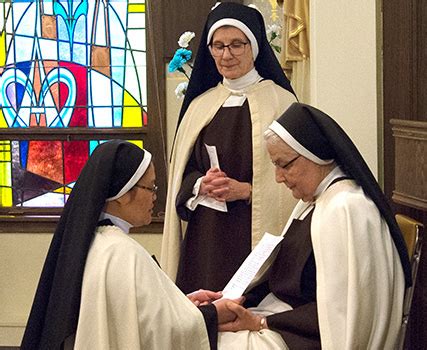Who better is there as our model for the contemplative life than the Blessed Mother. She is the ideal of this life consecrated to seeking God and toward an intimate union with Him. Everyone who wishes to imitate Mary will soon realize that her soul was a beautiful garden of virtues. Chief among her virtues is silence. Silence and peace reigned in her soul even amidst the turmoil of the world around her.
It is only in silence that God can speak to our heart. This state of stillness makes us able to listen and to be receptive to Him and His will. Silence helps our emotions by calming the body and ordering tranquility in the soul. Silence and peace in the soul enters when the noise of our passions and attachments have ceased within us.
Our Lady of Silence teaches how to live the hidden virtues of silence, listening and humility under God’s shadow. Her birth was unnoticed, yet without her the greatest mystery of our faith could not have taken place. It is because of Mary that the Incarnation of the Son of God and Redemption of man was made possible. Her birth is like the dawn projecting new light over the new day. However, Mary’s birth is unknown, unnoticed and not even mentioned in the scriptures. She remained hidden to the world except for the eyes of God, who saw her in the silence and obscurity of her life.
It was in silence that the angel, Gabriel, found Mary. Alone and in silent prayer, she was silent in the presence of God. This is love in action for a contemplative “the silence of love is love in silence.” To sit silently just loving God and letting Him love us and to transform us. To be alone with the “one who is alone”. To be silent like Mary “who was able to hear the voice of an angel”. (Marie-Aimee de Jesus)
By being silent one is able to stay away the evils that come about in the abuse of words. What do we have to talk about? What is it that we communicate when we speak? Ideas? Actually, most of what we communicate are images and impressions – mostly foolishness and nonsense. In reality the more we speak the more our interior recollection is clouded. While on the contrary, silence makes for recollection. Silence is difficult and poorly observed. This we can all agree. It costs.
Fr. Emiliano Antenucci has a lovely little booklet titled Our Lady of Silence. The booklet introduces devotion to Mary under this title and promotes the importance of silence, of not speaking badly of others, and of listening to God, all of which are important to the Holy Father, Pope Francis.
St. John of the Cross teaches that silence is the language God hears best; therefore, one ought to remain in silence with desires and tongue silenced. Thoughts and words are limiting. They limit time with the Lord. To be truly present before Him, the faculties need to be silenced and remain in a state of interior quiet. It is in this silent waiting of prayer through faith and love that will bring the soul to the God it is seeking.
We need to bring Christ into the lives of others, but first we need to begin by bringing Him into our own life. We can begin by inviting Him to join us in the interior of our heart: in deep recollection, in silence, and in solitude. Then we can hear His voice and prepare for His coming however He may manifest His presence.
We can add more silence into our lives by first setting aside useless chatter, then self-love, sensitiveness, the prattle of fantasy and imaginings, and the thoughts that flit from here to there. In addition to these, we can get rid of any preoccupation with useless things, so that we can hear the Lord speak.
Silence can be uncomfortable at first, but by gradually making some changes there can be more room for silence. We can begin by not turning on the radio after getting into the car. Forgoing the evening news, or maybe just by being more gentle and soft when we speak are other ways to add more silence. More ways to foster silence throughout the day can happen by eliminating gossip, curiosity, and any noisy habits that can disturb and upset us and our peace of mind. Silence can bring health to mind and body. The habit of silence will take some effort, but the fruits are precious: more calm, more peace, more attentive understanding towards God and others. Allowing more “space” to be silent with the Lord to hear what he has to say is the silence of contemplation.
Exterior solitude can assist in interior solitude enabling the spirit to soar up to God. This exterior solitude is in imitation of Jesus who often sought places of solitude to pray – to the mountain, the garden, a lonely place. Try to sit alone for five minutes in a quiet, comfortable place, then gradually add more time and just be still.
God comes and speaks to the heart in this solitude where there is silence of the senses and spirit. God, however, speaks silence, and for most of us He is passed by to the noisiness of the day and events that fill it. No one thinks to find Him in the silence – so near and within. Now this is where Mary can help us. She can teach us silence and how to listen. Mary shows us how to be attentive to the needs of others, how to be humble, docile and pure all the while trusting in the mercy of God. Let us learn to listen to Him speak to us in the Silence, letting Him love us, while we return the love.
“A silent heart is a pure heart; a melody singing in the heart of God. Like a sacristy lamp flickering noiselessly at the tabernacle, and like incense silently rising at the Savior’s throne, such is love’s silence.” (Marie-Aimee de Jesus)












